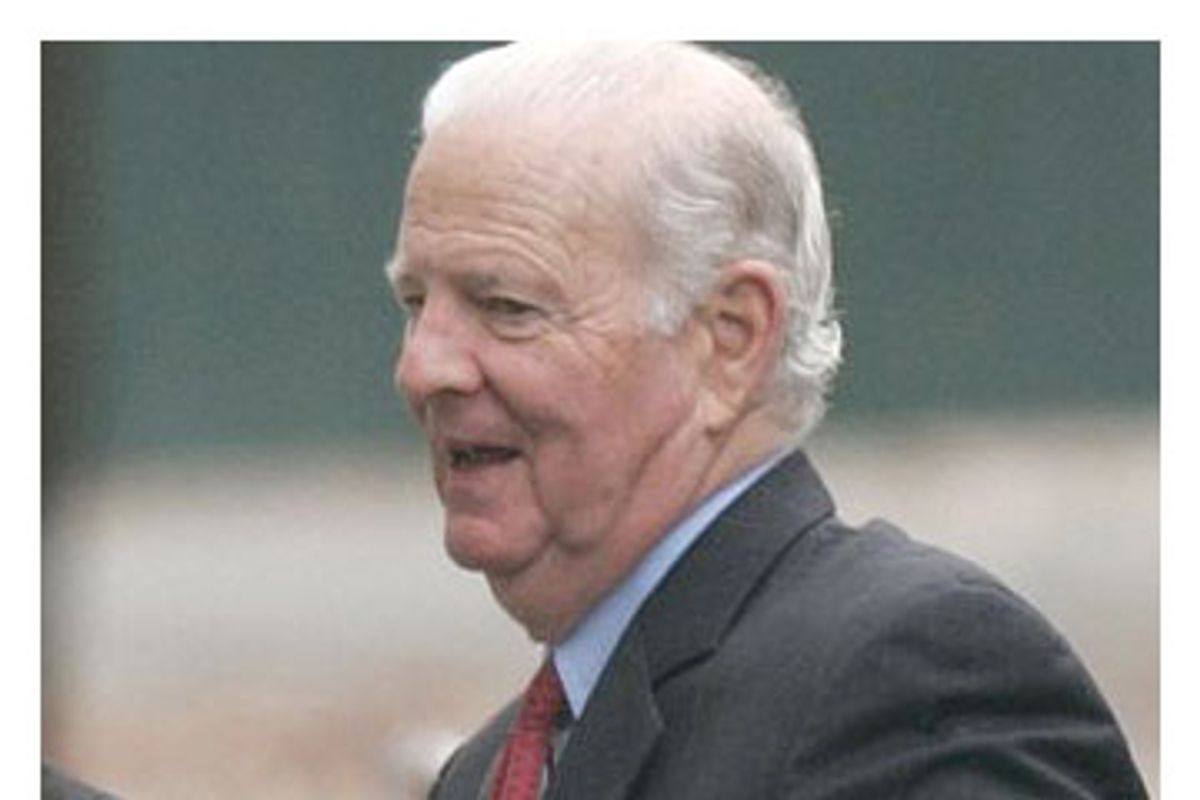Even before the electoral repudiation of President Bush, or "Sonny," as Colin Powell refers to him, the guardians of the Bush family trust surfaced as the presumptive executive committee of the executive branch. For years, Bush's father and his former national security team have attempted to rescue the president from himself -- and the clutches of Dick Cheney, Donald Rumsfeld and their neoconservative centurions. Earlier this year the elder Bush quietly approached a retired four-star general to inquire whether he would be willing to replace Rumsfeld, but that premature coup came to naught. Several of the father's associates personally warned President Bush before the Iraq war that it would lead to sectarian civil war, only to be dismissed with disdain. Immediately after the invasion, James Baker said, "I told him not to do that," a friend of Baker's told me.
The elder Bush's former tennis doubles partner at Houston's exclusive Bayou Club and subsequently his campaign manager and secretary of state, charged for decades with cleaning up family messes, Baker is now chairman of the Iraq Study Group and has assumed the aura of a regent. He is burdened with more tasks than those specified in his commission's brief about Iraq. Not only is he developing a whole new U.S. foreign policy, he is trying to salvage whatever can be retrieved from the wreckage of Bush's presidency for its last two years -- and to prevent the Republican Party, already having lost the crown jewel of the Congress, from being permanently tainted.
It is as though a merciless, omniscient narrator has inserted him to undo and rectify everything at the end of a tragedy. F. Scott Fitzgerald, near the conclusion of "The Great Gatsby," described the reckless scions of privilege: "They were careless people ... They smashed up things and creatures and then retreated back into their money or their vast carelessness, or whatever it was that kept them together, and let other people clean up the mess they had made."
There are complications. The discrediting and disloyalty of the neoconservatives have not removed them from the play. Just before the impending electoral doom, they scurried off the sinking ship. Richard Perle, former chairman of the Defense Policy Board, put the onus on Bush in an interview in Vanity Fair: "At the end of the day, you have to hold the president responsible." Kenneth Adelman, another neocon DPB member, who famously predicted the invasion of Iraq would be a "cakewalk," said of the Bush administration policymakers: "Not only did each of them, individually, have enormous flaws, but together they were deadly, dysfunctional."
Yet the neocons are still plotting to confound Baker. Clifford May, president of the neoconservative Foundation for the Defense of Democracies, and a member of the Iraq Study Group advisory panel, told me that ISG member Edwin Meese, Ronald Reagan's former attorney general, will thwart consensus by opposing the ISG's recommendations.
The neocon logic in favor of the Iraq war was that the road to Jerusalem led through Baghdad. In other words, an invasion would install an Iraqi democracy that would inevitably force the Palestinians to meekly submit to the Israelis. Now near unanimity exists on Baker's commission to reverse that formula, advisory panel members have told me. The central part of a new policy must be, they believe, that the road to Baghdad leads through Jerusalem.
Brent Scowcroft, the elder Bush's former national security advisor, who is very close to Baker, spelled out the notion that security and stability in the region, including Iraq, can only be achieved by reestablishing the Middle East peace process in an article published in the Washington Post on July 30. Scowcroft's piece is a précis of Baker's views as well. On Sept. 15, Philip Zelikow, Secretary of State Condoleezza Rice's counselor and a former Scowcroft protégé, echoed Scowcroft's ideas in a speech at Washington's Middle East Institute. Afterward, Cheney pressured Rice and she rebuked her closest deputy, underlining her own weakness.
Since then the electoral catastrophe has intervened, giving Baker leeway (and sidelining the feeble Rice). Baker even summoned Tony Blair to testify on Tuesday in support of a restart of the Middle East peace process. If Baker were to propose that, he would not explicitly state, though he well knows, that its enactment would require firings of strategically placed neoconservatives on the National Security Council and Cheney's staff, in particular Elliott Abrams, deputy national security advisor for global democracy strategy, who also handles Near Eastern affairs.
In the event that Baker actually advocates what he thinks, Bush's options will be to admit the errors of his ways and the wisdom of his father and father's men or to cast them and caution aside once again. His choice is either Shakespearean or Wagnerian.



Shares